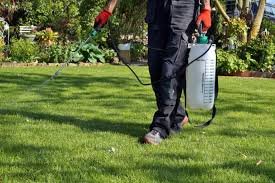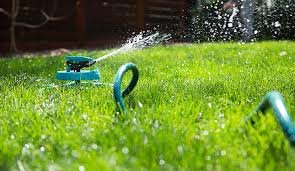Are you looking for ideas on how to get rid of crabgrass in lawn? Crabgrass is a warm-season annual lawn weed that infest most of lawns and it can spread very fast suppressing your lawn grass if not controlled on time.
At the end of its life cycle, crabgrass leaves behind thousands of seeds which remain dormant until the next spring season when they germinate and they begin another growth cycle again. It can prove futile to eliminate crabgrass from your lawn if you don’t clearly understand its lifecycle.
In this post, am going to share with you practical tips on how to get rid of crabgrass in lawn for good.
Pre-emergent Control
One of the easiest way of controlling the spread of crabgrass is controlling them before they even germinate.
Since there are thousands of dormant crabgrass seeds in your lawn soil waiting for the right season to germinate, you can use pre-emergent herbicides when preparing your lawn to prevent them from germinating.

Crabgrass seeds germinates during early spring when soil temperatures are 55 degrees high and they can continue germinating until late summer.
Therefore, you need a garden thermometer to regularly check the soil temperatures so that you can apply the pre-emergent herbicides at the right time for the best results.
Pre-emergent herbicides will inhibit seed germination as well as root development of crabgrass seeds and you will have less of them in your lawn.
Ensure that you use the right pre-emergent herbicide and follow instructions for use carefully to avoid any unintended damage to your lawn grass seeds.
- Apply this product only in EARLY SPRING and FALL
- Barricade professional-grade pre-emergent weed control is designed to prevent weeds, and will not aid in eliminating existing weeds.
- Contains 0.48% of the active ingredient prodiamine – Labeled to prevent over 30 grass and broadleaf weeds
- Trusted by top turf care professionals to prevent problem weeds without harming desirable plants
- DG Pro formulation allows for more particles per square inch of chemical – leads to better control of weeds
Last update on 2022-12-28 at 09:44 / Affiliate links / Images from Amazon Product Advertising API
Post-emergent Control
If the crabgrass seeds have already germinated, you need to apply a different strategy to get rid of them. Some of the most common and effective methods that you can use are;
- Use of post-emergent herbicides
- Uproot them by hand
- Prevent more crabgrass seed distribution
- Subdue their germination
Read Also; 5 Simple Lawn Care Tips for a Healthy Lawn
Use of Post-emergent Herbicides
If your lawn grass have already germinated and you can clearly spot traces of crabgrass in your lawn, consider going for selective post-emergent crabgrass herbicides.
This will ensure that only crabgrass get killed and your lawn grass remains untouched.
Follow instructions carefully when applying the herbicides and make sure it’s not non-selective because it will kill even your lawn grass.
- Liquid Harvest Mesotrione is a very useful herbicide as it prevents crabgrass seed germination and kills broadleaf weeds (dandelion and clover among others) on contact, while allowing certain cool season turfgrass to grow in a weed-free environment.
- Liquid Harvest Mesotrione has a 40% active ingredient that inhibits photosynthesis in susceptible plant species. It is distributed throughout the plant after being absorbed by the plants through roots, shoots and leaves.
- Liquid Harvest Mesotrione targets 46 broadleaf species of weed and grass. It can combat Barnyard grass, Carpetweed, Chickweed, Clover, Crabgrass (large & smooth), Dandelion, Foxtail, Goosegrass, Henbit, Yellow Nutsedge, Purslane, Thistle, Wild Carrot, and others.
- For use in Kentucky Bluegrass, Centipede grass, Buffalo grass, Tall Fescue, Perennial Ryegrass, Fine Fescue, St. Augustine Grass (grown for sod only). DO NOT apply this product on Bentgrass, Poa annua, kikuyugrass, zoysiagrass, seashore paspalum, or bermudagrass. Mesotrione can only be used on bermudagrass that is still dormant when trying to remove weeds or target grasses from it. If the bermuda is only semi dormant you will see whitening and damage to the bermuda.
- 4 – 8 oz. per 30 gallons of water per acre, use a Surfactant to Increase Effectiveness and be sure to read label for full instructions
Last update on 2022-12-28 at 09:48 / Affiliate links / Images from Amazon Product Advertising API
Uprooting Them by Hand
If you have a small yard, you can manage to uproot crabgrass by hand if they are just few percentage.
Do this when they are at manageable stage before they start producing seeds. By uprooting them, you will minimize seed production and they will reduce in number in subsequent seasons or vanish completely.

Curbing more Seed Distribution in your Yard
Controlling the spread of crabgrass seeds in all sections of your lawn is key to eliminating them.
After mowing or uprooting, bag all the clippings and plants and dispose them far away from your yard.
This method is effective in reducing the number of seeds which may remain dormant in your lawn soil after the end of crabgrass weed annual life cycle.
Subdue Seed Germination
Crabgrass lawn weed spreads fast in a lawn which has empty patches and on the lawn edges.
The best way to curb this spread is to have a thick, healthy and lush lawn.
When your lawn ground is densely covered by your lawn grass, it automatically subdues crabgrass seed from germinating.
Overseed any empty and dried patches in your lawn to ensure that you have a uniform and thick grass lawn. A healthy lawn can be achieved by;
- Mowing your lawn at the right time and height
- Water deeply and not very often
- Planting your preferred lawn grass type at the right season

How to Get Rid of Crabgrass Naturally
The best method of getting rid of crabgrass naturally is by adhering to proper lawn care practices. If you want a crabgrass free lawn, you must take charge of your lawn and break the growing cycle. You can do this by;
- Discovering crabgrass infestation early enough
- Controlling them before they germinate
- Uprooting them if it’s on a small yard
- Mowing at the right height
- Good watering cycles
A lush green lawn that is thick, healthy and weed-free is always eye-catching and attractive. Apply the above tips on how to get rid of crabgrass in your yard and you will attain your dream crabgrass free lawn.

